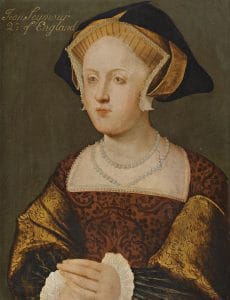 On this day in history, 7th June 1536, there were celebrations for the new queen, Queen Jane.
On this day in history, 7th June 1536, there were celebrations for the new queen, Queen Jane.
Henry VIII had married Jane Seymour, daughter of Sir John Seymour of Wulfhall, Wiltshire, and former lady-in-waiting to his second wife, Anne Boleyn, on 30th May 1536. Their relationship caused a bit of a stir, with Anne Boleyn only having been executed on 19th May, but their marriage and Jane’s new status was celebrated with a river pageant on the Thames, from Greenwich to Whitehall (York Place).
Here is an account of the pageant by herald and chronicler Charles Wriothesley:
“Also, the 7th day of June, being Wednesday in Whitsun week, the King and the Queen went from Greenwich to York Place, at Westminster, by water, his lords going in barges before him, every lord in his own barge, and the King and the Queen in a barge together, following after the lords’ barges, with his guard following him in a great barge; and as he passed by the ships in the Thames every ship shot guns, and at Radcliffe the Emperor’s ambassador stood in a tent with a banner of the Emperor’s arms set in the top of his tent and diverse banners about the same, he himself being in a rich gown of purple satin, with diverse gentlemen standing about him with gowns and coats of velvet; and when the Beach King’s [the Master of Ceremonies?] barge came by him, he sent two boats of his servants to row about the King’s barge, one of them were his trumpeters, and another with shalms and sackbuts, and so made a great reverence to the King and Queen as they came by him, and then he let shot a forty great guns, and as the King came against the Tower of London there was shot above four hundred pieces of ordinance, and all the tower walls towards the water side were set with great streamers and banners; and so the King passed through London Bridge, with his trumpets blowing before him, and shalms, sackbuts, and drummers playing also in barges going before him, which was a goodly sight to behold.”
I do wonder what the people of London thought about what was going on. We know that at some point between Jane’s arrival at Chelsea on 14th May 1536 and Anne’s execution on 19th May that Henry VIII wrote to Jane and in that he mentioned some pamphlets which were being spread around London deriding their relationship: “Advertising you that there is a ballad made lately of great derision against us, which if it go much abroad and is seen by you, I pray you to pay no manner of regard to it. I am not at present informed who is the setter forth of this malignant writing, but if he is found out he shall be straitly punished for it.” I expect, though, that in the main Londoners just got on with their lives and didn’t really worry about their king’s marital choices.
This day in 1520 was the first day of the famous Field of Cloth of Gold meeting between Henry VIII and Francis I – click here to read more about it.
Notes and Sources
Picture: Portrait of Jane Seymour, unknown artist, German.
- Wriothesley, Charles (1875) A chronicle of England during the reigns of the Tudors, from A.D. 1485 to 1559, Volume 1, Camden Society, p. 44. I modernised the spelling for ease of reading.